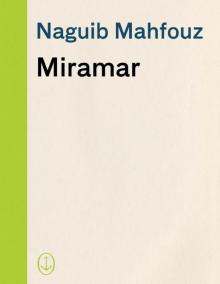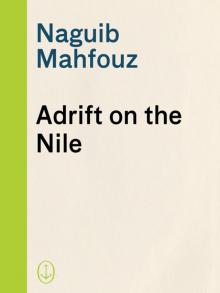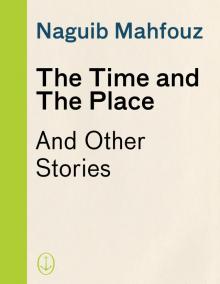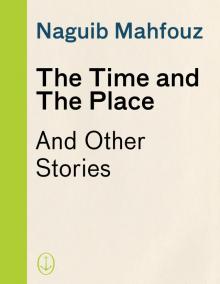- Home
- Naguib Mahfouz
The Seventh Heaven: Supernatural Tales Page 9
The Seventh Heaven: Supernatural Tales Read online
Page 9
“But I haven’t seen a single bottle go up there!” exclaimed the manager.
“Maybe they hid them in their pockets,” the bellhop surmised. “They’re singing, shouting and clapping—a case of drunken rowdiness, to be sure. And sinfulness too, for there’s as many women as men in that room.”
“And the informer?”
“I heard his voice singing, ‘The World Is a Smoke and a Drink,’” said the bellhop.
Thunder boomed outside as the manager said to himself, “I could well be dreaming—and I could just as well have gone mad.” At that instant, a group of common people approached—their faces and clothes proclaimed their low social status. They asked the inevitable question, “Is Ms. Bahiga al-Dahabi staying here?”
The manager smiled despairingly as he contacted the woman. She asked him to keep them waiting in the lobby and to serve them drinks as well. He pointed the way to the group of them and ordered the staff to give them tea. The lounge was overflowing, upsetting the undertaker. The manager again smiled hopelessly, muttering, “This hotel is no longer a hotel, and I’m no longer the manager, and today is not a day, and lunacy is laughing at us in the shape of meat and wine!”
The rain began to gush down again in sheets, and the sky to thunder. The asphalt at the hotel’s entrance gleamed with the light of the electric lamps as feet scurried in from outside. The waiters all cried, “There is no god but God!” while the passersby took refuge in the foyer. The battering blows of the rain rattled the window-panes without ceasing.
The manager left his post and went to the entrance, turning his face up to the blackened sky. Then he looked down at the water sluicing stones over the sloping ground. First the rain beat down, then it flared up with wrath, before detonating in a surging deluge over the hapless earth.
“There hasn’t been rain like this for at least a generation,” he declared.
Digging back in his past, he remembered a similar flood from his childhood. He recalled how it stopped all means of transport, blocking up the alleys and completely drowning rooms—and those in them—beneath porous roofs. He then went back to his desk, intent upon his work with the hotel records and expenditures, but he also issued orders to tighten the surveillance of the rooms and of the roof. He called for the head bellhop and asked him, “What news of room number twelve?”
“The singing and laughing show no sign of stopping,” the man said, twisting his lips. “They’re crazy in there!”
Blind Sayyid the undertaker loomed at the lobby’s door.
“Get back to your place!” shrieked the manager.
The man held up his hand in entreaty, and the manager yelled at him once more, “Not another word!”
The thunder clapped like bombs as the massive rain pounded the pavements with incandescent intensity. The manager mused that the old hotel wasn’t built with reinforced concrete—and the night warned of yet more travails.
Another bellhop told him, “There are complaints in room number twelve about the leaky roof and the water pouring in.”
“You mean they’ve stopped laughing and singing?” the manager demanded, exasperated. “Then let them all leave the room now!”
“But they can’t!” protested the bellhop.
The manager dismissed him once again and called the head bellhop, asking him about what his assistant had said. “The rooms are all leaking, so I’ve mobilized all the men to plug the holes in the roof with sandbags.”
“And what about room number twelve?”
“They’re all jammed in there too tightly. Their stomachs have inflated so much, they can’t open the door. They can’t even move!”
Cosmic ire was smiting the night outside, while inside a frenzied air of activity filled the hotel as the bellhops scurried about with sandbags to halt the invading rain.
Then a most peculiar thing happened: the people who’d been waiting in the lobby rushed voluntarily to aid in the effort. The manager watched all this with delight— made greater by the fact that Blind Sayyid the Corpse Washer did not take part.
After a while the head bellhop reported on the work’s progress. “They’re putting all they’ve got into it,” he said with pride. “But as for our friends in room number twelve, their condition is very bad—and getting worse and worse all the time.”
What the man said struck the manager like a shock— and amid the violent, pent-up tension of the entire day, he snapped. His anger taking hold of his flesh, his blood, and his nerves at once, he finally surrendered his last shred of sanity.
“Listen.” he said. “Remember exactly what I’m about to tell you….”
The bellhop stared at his face in terror as the manager shouted with stark resolve, “Ignore room number twelve and everyone in it!”
“Sir, the men are screaming and the women are crying!”
Bellowing like a beast, the manager railed, “Concentrate on the roof over the guest rooms—but as for room number twelve, leave it alone—and everyone inside it!”
The bellhop tarried for merely a second, and the manager foamed with an even more animal-like fervor, “Carry out my instructions to the letter—without dragging your feet!”
He moved to face the window and watched the storm crashing in the heart of the darkness, waxing more and more perilous with each passing moment. Yet he felt his great burden lighten, as his confidence returned with his clarity of mind.
The Garden Passage
After long hesitation, I decided to go.
The curtain dropped at nightfall. Engulfed by the waves of gloom that swept Virgo Star Alley, I knew my path by the backlight of memory—the destroyer of darkness and the sojourner’s guide. I squeezed through the iron gate that hung ajar, to be struck by the scent of a familiar incense. To my good fortune, I found no visitors in the house. She appeared to me alone, sitting cross-legged on her Persian divan, wrapped in a robe of many quiet colors embroidered with a pattern of crescent moons and flowers, drawn over the curves of a distinctly firm form. Her eyelids dangling like veils, in her fingertips she held some cards—she never grew bored peering into the Unseen on her own. She did not lift her eyes toward me, as though she knew who was coming by the sound of his footsteps, and as if she intended to pay him no heed. Sensing strongly that I was intruding, I did not offer her greetings, but sat in the chair nearest her, seeking refuge in silence. She continued reading her cards as I contemplated how to open our conversation, when all that I had prepared to say evaporated from my mind under the effect of this room, grave with the remains of days gone by. Suddenly she started, as though the cards had yielded an unusual revelation.
“I see a final assault upon his stubbornness!” she whispered.
She let out an “Oh!” of pleasure, muttering as she completed her vision, “A lead-tipped whip shall scourge his back!”
“What’s passed has passed. I must look toward tomorrow,” I said in recognition of her allusion to me.
“Your indulgence, my master!” she exclaimed, as though surprised by my presence.
“I came to settle my debts and to look toward tomorrow,” I replied, putting a medium-size envelope in front of her.
“He came to settle his debts and to look toward tomorrow,” she declaimed to her cards.
“Bread and salt have brought us together, and you are the mistress of those who know!”
Sounding straightforward at last, she replied, “Such things happen every day.”
“This is the time for but one request,” I said heatedly.
“Security,” she said quietly.
y “Security,” I echoed, feeling encouraged. “Whenever I consult a friend on the matter, they always point to just one man.”
Smiling, she replied, “He is the one who is always pointed to these days.”
“As he is known for his hatred of intermediaries, I have not found anyone to intercede for me,” I said with worry. “Yet they tell me that none of the great ever turn you aside.”
“This is true, if they have been
my companions,” she admitted with pride.
Not knowing what to say, I simply sighed, when she said in a kindly tone, “You must find your own way.”
“You’re joking,” I said, a sarcastic laugh escaping my lips.
“If only he came one time to his queen, like the others,” she lamented. “Most of the patrons at the Moon Tavern are my minions—except for him.”
“If only this miracle would occur!” I said wistfully.
We stared at each other for quite a while, until her eyes widened with a dawning insight. She giggled, then asked me, “What do you think?”
I gazed at her questioningly.
“You will undertake a mission,” she declared.
“What mission?”
“That you bring him here to me.”
“But how?”
“He leaves the Moon Tavern at midnight,” she said. “Then he cuts through the Garden Passage to the square, where his car is waiting—the passage is the most fitting place for you to meet him.”
“But he doesn’t know me from Adam!”
“Use your manners as a man of good family to approach him,” she said, drowning in laughter, “and whisper to him, ‘Do you crave a tasty glass? A clean, well-hidden house?’”
I scowled as I turned my face away from her, seething with derision.
“My suggestion doesn’t please you?” she asked.
“Mock my predicament all you want!”
Earnestly she rejoined, “I’m quite serious, if security is truly what you seek.”
“How do you imagine I would accomplish that myself?” I bristled in annoyance.
“What is it but a fleeting adventure that flows from the search for what is sought?”
“Don’t you have many who are professionals in that?” I asked, trying to hide my trepidation.
“I do not need any of them,” she said with disdain.
“Yet I would be your first choice?”
“This is only an escapade—don’t you understand?”
“No, I understand nothing.”
“But it is your duty to understand,” she scolded. “There’s no harm if you pick a spot far from the lamplight, so the darkness might embolden you.”
“And what about my dignity?”
“I’m not calling on you to make this your livelihood,” she protested. “It’s a one-time gambit. If you reject it, then you must know another way to reach your goal.”
On my way back, I was so upset that I could scarcely see what was in front of me. I had absolutely no doubt about the power that woman held over men. Yet, driven by an angry, petulant resolve, I refused to submit, until I imagined that I was no longer obsessed with my quest for security—a person’s last refuge when nothing else remains. It was as though I cared little about having to endure the demon of inflation, the ordeal of survival, the debasement of a time of deprivation. A merciless, ceaseless war broke out in my head. I kept wandering through the cafés and bars in a night that did not want to end. And not long before midnight I found myself standing in the Garden Passage in the furthest place away from the lamplight. What had brought me here? Perhaps I wanted to catch a glimpse from up close of that man whom I had seen only in the newspapers on momentous occasions.
He seemed to move with astral discipline—for at precisely the stroke of midnight his towering frame emerged from the Moon Tavern, tearing the silence with the tread of his heavy footsteps. My heart pounded as I tumbled from my lofty heights, and as he passed before me on his route to the square I took a step toward him. Immediately my mind was shattered by many terrors. I could almost feel the fingers pointed accusingly at me. My memory failed and my tongue froze. Abruptly aware that I was there, the man struck the ground with his cane to scold me for coming too near—so I quickly backed off, while he continued on his way.
All the next day I berated myself brutally. Why did I go to the Garden Passage? Why did I try to approach that man? And what kept me from speaking but my mind becoming scattered and falling prey to fears? The truth is that I am terrified of people—they are the ghosts that relentlessly pursue me. What good would they do me tomorrow, if the struggle to survive and the humiliation should grow even crueler?
I set off with great force to chase the strange things out of my life—and it never occurred to me that I would take up my position in the Garden Passage once again, just before midnight. Determined and confused, I waited until I found the man coming toward me on his course to the square. Drawing close to him, I whispered, “I have a cup and a lovely playmate, and a safe shelter as well!”
Rapidly he turned toward me. Though the darkness stood between us, there is no doubt that he knew my shape.
“A curse upon you,” he said acidly, looking away.
I burned with shyness and shame—though he did not bat an eye. I had sold my most precious possession for nothing. I had accepted degradation, while he displayed only contempt for me.
At next nightfall, I returned to Virgo Star Alley. No sooner had she received me, reclining on her divan, then she called out to me, “Failure is written clearly on your face!”
“We must find another means,” I said, sagging forward in my chair in despair.
When I recounted to her what happened, she chuckled sardonically.
“What a mule you are,” she berated me. “You approached His Honor in such distinguished attire?”
“What else could I have done?” I answered exasperatedly.
“Perhaps he thought you were one of his rivals, trying to trip him up!”
“In any case, that only confirms that we have to find another way.”
“There is no other way,” she insisted sternly. “You must correct your technique.”
I stared in disbelief at her comely face.
“You should wear the proper dress for your task,” she declared.
I went home angry with her, as well as with myself, and my demanding desire for security. Days passed while I was absorbed in a mad dialogue with my own mind, until I found myself clad in a gallabiya and skullcap, worn-out sandals on my feet, waiting at the same place in the Garden Passage once more. So abased did I feel that it became easy for me—and I no longer let it bother me. When the time came, the man loomed before me with his imposing height. I paused until he was parallel with me, then leapt into action, saying, “I have something for which the eye longs, and for which the soul lusts.”
He raised his walking stick at me till I retreated in fright. Then he asked with scornful irony, “What did you say, Your Majesty?”
I fled again to my home, rebuking my disordered self, immersed in the depths of my accumulated angst. As my resentment redoubled, so did my will to succeed as well. I went to the lady and defiantly told her my story. Though shaking her head in regret, she said, “You really are a mule—you need someone to lead you every step of the way.”
“I slunk up to him just as any derelict would do!”
“And your voice?” she taunted.
“My voice?”
“Did you talk down to him in the same manner you use with your underlings?”
“I don’t think so,” I said with evident misgivings.
“Don’t waste time,” she interrupted. “I’m an expert in these affairs!”
I disappeared for some days, which I spent in anguished contemplation, practicing without any thought of ever giving up. How could I stop trying, when I had sold everything for nothing? When I again took my position in the Garden Passage, patience had depleted me, as well as worry and pain. But then the expected moment came, and I stepped forward nimbly. Lowering my head in humility, I blurted dejectedly, yet with a bitterness that I could not disguise completely, “I have something good for you—in a secure, respectable dwelling.”
He kept on going without acknowledging me. Once again I tried to make him hear me.
“You make it sound like a funeral,” he rebuffed me.
Promptly grasping my blunder, I became enraged at myself for the excessive resentm
ent that had showed in my voice. I confessed everything to the lady, only to endure her ridicule.
“I will not try again,” I said resignedly.
“Have you given up—haven’t you even an inch of patience left?”
“The errors are endless,” I snorted. “I’ve had enough.”
“Think it over for a while, my old friend,” she said in a heartening tone, carefully avoiding any hint of condescension.“How can you consider yielding to despair when you are so close to succeeding? You imagine that you have used up all your forbearance, but what does forbearance cost compared to your ultimate satisfaction? You had a strong start, and no one can say that you haven’t made good progress so far. Don’t forget that, in the end, you’re trying to catch just one man—and not just any man.”
“He doesn’t seem like the kind who would welcome that to me,” I said skeptically.
“But that’s just the kind he is!” she laughed, then continued more soberly, “If I weren’t sure of what I’m saying, then I wouldn’t have urged you to make this effort. I’m not one of those who would betray bread and salt.”
I left her with my spirit revived, the rose once again blooming in my breast. I waited patiently for days, with no other interest but the Garden Passage, until I found myself again at my accustomed station. As I observed him coming with his sublime stature, I waited until he passed directly in front of me. Then I trailed him abjectly, mumbling, “Don’t let the chance of a lifetime elude you!”
When he paid no attention to me, I dogged him obstinately, whining to him softly, “A safe house truly, appropriate for Your Excellency!”
“Where?” he asked abruptly.
With a pleasure I had never before felt in my life, I told him, “In Virgo Star Alley, the third house on the right within.”
When we came close to the square he called out to his driver. As the man scurried up to him, he ordered him loudly, “Hold this creep, and get the police!”
Desperately, I thrust the palm of my hand over the driver’s mouth. “No—wait—I’m not one of them!” I implored him. “I’m a respected person!” I panted, my heart racing.

 Miramar
Miramar The Mummy Awakens
The Mummy Awakens The Beginning and the End
The Beginning and the End Respected Sir, Wedding Song, the Search
Respected Sir, Wedding Song, the Search The Mirage
The Mirage Novels by Naguib Mahfouz
Novels by Naguib Mahfouz Adrift on the Nile
Adrift on the Nile Karnak Café
Karnak Café Heart of the Night
Heart of the Night Before the Throne
Before the Throne The Time and the Place: And Other Stories
The Time and the Place: And Other Stories Cairo Modern
Cairo Modern Arabian Nights and Days
Arabian Nights and Days The Day the Leader Was Killed
The Day the Leader Was Killed Morning and Evening Talk
Morning and Evening Talk Three Novels of Ancient Egypt Khufu's Wisdom
Three Novels of Ancient Egypt Khufu's Wisdom Akhenaten: Dweller in Truth
Akhenaten: Dweller in Truth Children of the Alley
Children of the Alley Voices From the Other World
Voices From the Other World The Harafish
The Harafish The Quarter
The Quarter The Seventh Heaven: Supernatural Tales
The Seventh Heaven: Supernatural Tales The Cairo Trilogy: Palace Walk, Palace of Desire, Sugar Street
The Cairo Trilogy: Palace Walk, Palace of Desire, Sugar Street Khan Al-Khalili
Khan Al-Khalili Three Novels of Ancient Egypt Khufu's Wisdom, Rhadopis of Nubia, Thebes at War
Three Novels of Ancient Egypt Khufu's Wisdom, Rhadopis of Nubia, Thebes at War Three Novels of Ancient Egypt
Three Novels of Ancient Egypt The Time and the Place
The Time and the Place Palace Walk tct-1
Palace Walk tct-1 Akhenaten
Akhenaten The Seventh Heaven
The Seventh Heaven The Thief and the Dogs
The Thief and the Dogs The Cairo Trilogy
The Cairo Trilogy Sugar Street tct-3
Sugar Street tct-3 Palace of Desire tct-2
Palace of Desire tct-2 The Journey of Ibn Fattouma
The Journey of Ibn Fattouma